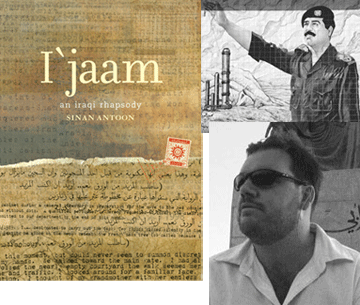
[The following is an excerpt from Sinan Antoon’s recently published translation of his earlier Arabic novel about life in Saddam’s Iraq.]
Two clouds kissed silently in the Baghdad sky. I watched them flee westward, perhaps out of shyness, leaving me alone on the bench beneath the French palm tree (so called because it stood in the courtyard in front of the French department) to wait for Areej. I looked for something worth reading in that morning’s al-Jumhuriyya, and found a good translation of a Neruda poem in the culture section, besieged [beside?] on all sides by doggerel barking praises of the Party and the Revolution. The breeze nudged the palm fronds above my head to applaud. It was April, “the month of fecundity, the birth of the Ba’th and the Leader,†as one of the posters on the college walls announced.
“Good morning.â€
I longed to hear the warm, milky voice of Areej, but this was not hers. It was the voice of Abu ‘Umar, the security officer enrolled as a student in the English department. He wore grey pants and an open-collared shirt. Accompanying him was another of his feces [species?] – short, long-faced, with a thick moustache. This one wore a blue safari shirt, the fashion of choice for all mukhabarat, the secret police, regardless of season or occasion.
“Comrade Salah,†said Abu ‘Umar, introducing the short man, elongating the final “a†of his Samarra’i accent to make it sound closer to its Tikriti variation. Abu ‘Umar’s reddish mustache reminded me of the cockroaches that invaded our bathroom at night, thwarting our every eradication campaign. Like most of his colleagues, Abu ‘Umar never made any effort to conceal his occupation. He rarely attended classes, and his age (he was in his late thirties) was a clear sign he wasn’t an ordinary college student. In times of war, graduates were immediately conscripted, and except for graduate students who had secured special permission to continue their studies, no one could linger in college to change disciplines or get a second degree. Abu ‘Umar, however, transferred to the English department halfway though the academic year, after he had spent three years in the Arabic department.
Comrade Salah would like to ask you a few questions,†he said. I couldn’t hide me anxiety, but I answered with an unhesitant, “Of course.†Salah smiled viciously and asked me to come with him.
“Where?â€
“To the office. It won’t be more than half an hour.â€
I had thought a great deal about this moment, but could never seem to summon discretion enough to avoid it. Abu ‘Umar gathered the books stacked on the bench beside me and put them in my hands. We walked toward the main gate. I had always complained about the distance between the gate and the lecture halls, but that morning as we crossed the nearly empty courtyard the walk seemed mercilessly short. It was early still – I liked to arrive before most students to avoid Baghdad’s morning crowds and traffic…
We crossed the courtyard that separated the English department from the dean’s office, passed by the Student Union, and turned left toward the main entrance. Through the iron gate I could see a Mitsubishi with tinted windows. It was parked beneath the mural erected in honor of the Leader’s honorary doctorate in disorder [law?]. He wore a university gown and held a degree in his hand. The inscription read, “The pen and the gun have one barrel†[A saying of our great Leader, may God preserve him.].
The Ministry of Rupture and Inflammation [Could this be the Ministry of Culture and Information?] would daily bombard us with slogans and chants, and I retained my sanity by rearranging their words and images to better suit my mood. I began with some political songs, which could be improved with a simple stroke. In the name of the people and the Nation, I unsheathed my invisible pen and began to improve my superior’s verses:
House by house
Our leader calls on us
And fucks [The original lyrics read, “tucksâ€] us into bed …
[Excerpt from Sinan Antoon, I’jaam (San Francisco: City Lights, 2007), pp. 1-3.]